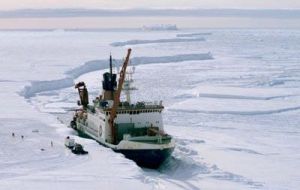MercoPress. South Atlantic News Agency
Melting Arctic sees first vessel through Northwest Passage
 Scientific vessel ?Polarstern?
Scientific vessel ?Polarstern? The German Institute Alfred Wegener said on Friday that a scientific expedition for the first time was able to navigate the fabled Northwest Passage linking the Atlantic and the Pacific oceans along Arctic waters bordering Russia and North America because they were free of ice
"The scientific research vessel "Polarstern" returned this morning from the Arctic to Bremerhaven (northern Germany). It was the first ship to have crossed the Northwest and Northeast passages" without having to break any ice reported an institute spokesman according to the French news agency AFP. The Arctic ice cap, which in August saw its largest seasonal melting since satellite observations began 30 years ago, completely disappeared in the Northwest and Northeast passages in September, the European Space Agency confirmed on October 7. According to the United States National Snow and Ice Data Center, Arctic sea ice coverage during September was at its second lowest extent since satellite records began in 1979. Average ice extent during September was 1.80 million square miles, which is 34% below the 1979-2000 average and is part of an 11.7% decline in extent per decade over the past 30 years. The record lowest extent, set in 2007 was 1.65 million square miles. The US National Oceanic and Atmospheric Agency, NOAA, also reported about the continued warming in the Arctic. "Temperature increases, a near-record loss of summer sea ice, and a melting of surface ice in Greenland are among some of the evidence of continued warming in the Arctic, according to an annual review of conditions in the Arctic issued by NOAA and its university, agency, and international partners". Changes in the Arctic show a domino effect from multiple causes more clearly than in other regions," said James Overland, an oceanographer at NOAA Pacific Marine Environmental laboratory in Seattle and a lead author of the report. "It's a sensitive system and often reflects changes in relatively fast and dramatic ways." One example of these changes in arctic climate is the autumn air temperatures which are at a record 5 degrees C (9 degrees F) above normal, because of the major loss of sea ice in recent years. The loss of sea ice allows more solar heating of the ocean. That warming of the air and ocean affects land and marine life, and reduces the amount of winter sea ice that lasts into the following summer. The year 2007 was the warmest on record for the Arctic, continuing a general Arctic-wide warming trend that began in the mid-1960s. "Polarstern" left Bremenhaven on June 12th for a 70 days tour which included Greenland, Reykjavik and the heart of the Arctic. "The goal of the trip was to reach the heart of the Arctic for research purposes, which is not always possible, but this time it was", said Karin Lochte head of the Wegener Institute. In spite of the scientific research opportunities "what was frightening was the impact of global warming", which enabled the vessel to make it through the Northwest Passage added Ms. Lochte. Among other things "the 117 scientists from 12 different countries on board the "Polarstern" were able to see birds which usually belong to the North Atlantic".




Top Comments
Disclaimer & comment rulesCommenting for this story is now closed.
If you have a Facebook account, become a fan and comment on our Facebook Page!